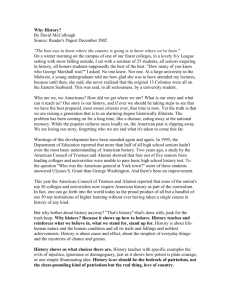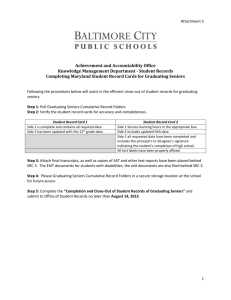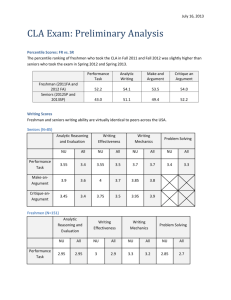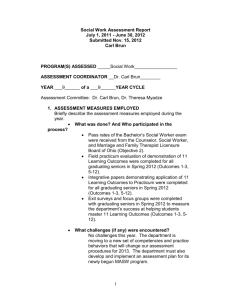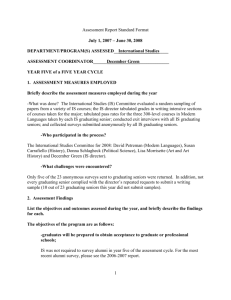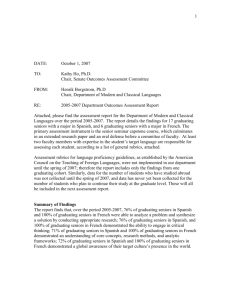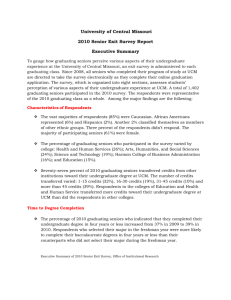12-4 Talking to Parents about College
advertisement
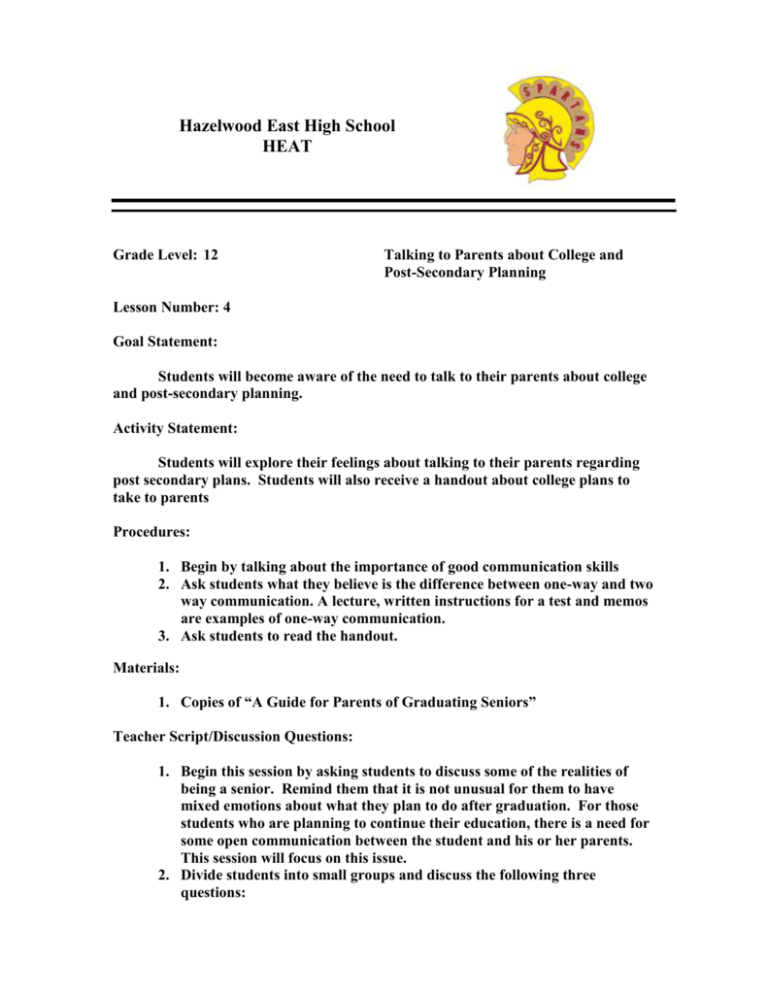
Hazelwood East High School HEAT Grade Level: 12 Talking to Parents about College and Post-Secondary Planning Lesson Number: 4 Goal Statement: Students will become aware of the need to talk to their parents about college and post-secondary planning. Activity Statement: Students will explore their feelings about talking to their parents regarding post secondary plans. Students will also receive a handout about college plans to take to parents Procedures: 1. Begin by talking about the importance of good communication skills 2. Ask students what they believe is the difference between one-way and two way communication. A lecture, written instructions for a test and memos are examples of one-way communication. 3. Ask students to read the handout. Materials: 1. Copies of “A Guide for Parents of Graduating Seniors” Teacher Script/Discussion Questions: 1. Begin this session by asking students to discuss some of the realities of being a senior. Remind them that it is not unusual for them to have mixed emotions about what they plan to do after graduation. For those students who are planning to continue their education, there is a need for some open communication between the student and his or her parents. This session will focus on this issue. 2. Divide students into small groups and discuss the following three questions: 3. 4. 5. 6. a. What are the most difficult post secondary issues to discuss with your parents? b. What do you think makes these issues difficult to discuss? c. Do you think both you and your parents are fully informed about what needs to be done regarding post secondary education plans? If time permits, allow students to share their concerns with the whole class. Be sure to have enough time to pass out “A Guide for Parents of Graduating Seniors.” Take a few minutes to point out how this resource can be used as a guide to help open up some communication lines between seniors and their parents. Encourage students to give this handout to their parents. Tell students that the Tips sheet is divided into three seasons: fall, winter, and spring. Help students see that it provides gentle reminders for the parents. Finally, encourage students to take this resource to their parents AFTER they have read it, so they understand what is being communicated. Discussion Questions: 1. After skimming the “Guide for Parents of Graduating Seniors,” how do you think this will help? 2. How easily has it been for you to discuss your future dreams with your parents? Integrative Closing Statement: Seniors are experiencing many transitions in their lives. While seniors are maturing and becoming healthy young adults, the need to connect with parents is important. For most seniors, they must still depend upon parents for financial support and assistance in order to continue their education. This session was designed to give some time for seniors to explore their feelings around their communication with their parents, and, specifically, to provide a generic resource to discuss post secondary plans. A GUIDE FOR PARENTS OF GRADUATING SENIORS FALL Assist your child as he/she begins to finalize his/her list of prospective schools. Monitor the decision making process. Allow your child to process information independently. Aid your child to establish criteria and evaluate characteristics. Take care to let the child take charge and assume primary responsibility for this activity. Attend college fairs, college nights and special workshops with your child. Ensure that your child requests admission packets from prospective colleges early. It takes time to complete application forms; secure teacher/counselor recommendation letters and transcripts and file college entrance examination scores. It takes more than just a few days or weeks. Encourage your child to apply for admission early. There are various types of admission processes; early, rolling, regular. Check to be sure that your child has registered for the college entrance examinations deemed necessary by the prospective college(s). Remind your child that the earlier he/she takes the exam, the earlier the scores will be reported. The later the test, the more likely the scores will not arrive in time for his/her application to be considered by the admissions department. Take steps to insure that the scores have been reported to the proper college and schools. One wrong digit could send the results to the wrong school. Transcript requests take time to process. Some schools have one person assigned to the task; other schools may only process requests once a week; still others may process requests upon demand. Encourage your child to identify the staff person who handles transcripts and to contact her early. Recommendation letters also take time! Advise your child to give counselors, teachers, community leaders, and others who will be asked for letters of recommendation enough time to complete their task. Remind your child that it takes more than a few minutes to write a good letter of support and maybe even longer to type and mail by a certain deadline. Encourage him/her to be considerate. Continue to examine your family's financial status. How's the savings plan coming? Will your child need t o look for several sources of financial assistance or just one or two? If financial assistance is needed, encourage your child to contact those foundations and organizations that award scholarships and grants and apply for those that are most appropriate. Be sure that your child has requested application packets and has complied with the award dates. WINTER Assist your child in the completion and submission of student needs analysis forms. The FAFSA (Free Application for Federal Student Aid) and other similar forms should be submitted at the beginning of the calendar year. Any forms submitted before January 1 will be returned to your child. These forms will ask for YOUR income information – if you have not completed tax forms, most of these forms will allow you to estimate your income and tax contributions. Continue to monitor and assist your child in his/her efforts to submit admission applications and to chart acceptance and rejection responses. Encourage your child to “touch base” with persons who have agreed to write recommendation letters. Advise your child to monitor timeliness and insure that deadlines are not missed. A wall chart or file folder can be useful in keeping track of the correspondence. Ask your child to monitor the progress of the mailing of his/her transcripts. Some colleges will ask for transcripts to be sent during the first term of the senior year and once again during the winter or spring terms. Requests vary. Encourage your child to allow time for these documents to be processed and mailed. Assist your child in the filing of financial forms requested by the school. Some colleges will have their own financial aid application packets as well as standardized forms. These need to be completed also. Ask your child to contact the financial aid department of the school to see if additional documents are necessary. By now your college bound child should have received and SAR (Student Aid Report). If the form is correct, it should be mailed directly to the college. If it is incorrect, new information should be sent back to the financial aid form agency. Contact your child's guidance counselor for more directions. SPRING Encourage your child to discuss his/her college fears, thoughts, and ;dreams with you, the counsels, and teachers. Support your child as much as possible during decision making. Aid your child as he/she prepares letters of acceptance and rejection to be sent to various colleges. Encourage your child to send letters as soon as he or she has made a decision. Join your child as he/she considers and decides upon the terms of the financial aid award package offered. Suggestion: Discuss each source of financial aid separately. Offer ;your interpretation of the meaning and usefulness of loans, grants and scholarships. Ask the school counselors for assistance and information. Encourage your child to view you as a valuable resource. Help your child to enhance his/her test taking, study, and note taking skills. Stress the importance of these skills when tackling college-level study. Encourage your child to maintain a log of all transcripts mailed to the schools. It will also help to keep a list of all the institutions that accepted his/her request for admission. SENIOR INFORMATION SHEET FOR PLANNING FOR COLLEGE OR POST SECONDARY TRAINING The senior year is important in making college and post secondary plans. The following overview offers you some guidelines for applications and necessary procedures. RECOMMENDATION TIME: Ask teachers who know you fairly well. Make sure the teachers know something about you, what you enjoy, and things at which you excel. Be sure they can give you a good recommendation. Guidelines for securing a better recommendation: Be prompt. Your teachers are swamped, so give them plenty of time. Give teachers all necessary materials, including your application deadlines and a stamped, addressed envelope. Waive your confidentiality rights. Pick your recommenders wisely. Don't pick a teacher just because you received an A in the class; its important that the teacher knows you on a personal level. Send a thank you note. ESSAY TIME: Some schools will ask you to write an essay for admission. Here are some fundamentals: Good writing is writing that is easily understood. Avoid the overuse of adjectives, adverbs, “big” words, the word”however” and exclamation points. Buy and read Elements of Style by Strunk and White. You'll refer to it forever. Have one good writer critique your essay, and another proofread it. Stick to the length required. Get your point across by not repeating information from other parts of your application, avoiding generalities, maintaining the proper tone, and writing about something you really care about unless the topic is assigned. Avoid the following topics: relationship with girl or boyfriend, religious beliefs or political view, drugs, sex, alcohol, and controversial topics like abortion. MISCELLANEOUS: If you are not happy with the Spring ACT or SAT, retake in October. If you need to take the SAT II, now is the time. Send in your applications as soon as they are ready. Apply to your first choice by November 1st. Out-of-state schools have early application deadlines. Extracurricular: Colleges prefer that you focus on a few worthwhile: students newspaper, student government, the choir/band/orchestra, varsity sports, community service, all state anything, founded your own business. Acceptance letter: Keep your fingers crossed for fat envelopes. Some colleges are going to accept you and some are not. Don't take it as a personal insult. It's tough to choose among lots of people you have never met. Decisions: You may have to choose between the training schools or colleges that have accepted you. This may be a good time to revisit the schools.
